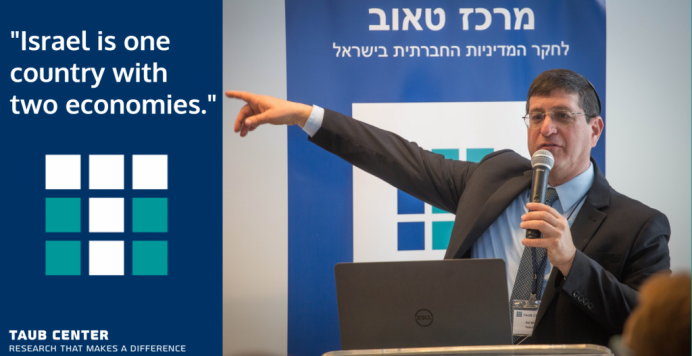Professor Avi Weiss is the former Chief Economist and Deputy Director of the Israel Antitrust Authority and now serves as President of the Taub Centre. In this interview, he discusses the strengths and weaknesses of Israel’s economy, argues that its greatest growth potential lies in the Arab community, and warns that the potential of Israeli high-tech success to lift the entire economy is being squandered by sell-offs.
The economy and the elections
Samuel Nurding: On 17 September 2019 Israelis will be going back to the polls for the second time this year to cast their vote in parliamentary elections. Is the economic issue playing any role in the campaigning process?
Avi Weiss: What makes the current election process exceptional (aside from the very need for a second election process within a few months) is that the economy is not at the centre of the campaigning. When the parties have discussed economic issues, it has generally been in very general terms such as the need to take steps to lower the cost of living, lessen inequality and poverty, and increase productivity.
One possible reason for this is that there has been an increase in the deficit in the past year – from under 3 per cent to well over 4 per cent – and no one really wants to talk specifics about what they would do to rectify that situation in the future. Over the past two decades, government expenditure as a percentage of GDP fell from over 90 per cent to under 60 per cent, and with it the government deficit. The result was a continual improvement in Israel’s credit rating, which allowed the country to borrow at low interest rates. But a number of agreements reached last year have led to a large increase in the deficit, which raises serious concerns going forward. It is well recognised that a decrease in the credit rating would be very costly, and that to keep the country’s rating high the deficit will have to be cut, which will require either cutting expenditure or raising taxes. As these are both highly unpopular options, it is safer for parties to stay away from the issue during the campaign.
The state of the Israeli economy
SN: What is the state of the Israeli economy and how does it compare to other OECD countries?
AW: Israel has had a pretty good decade. Economic growth has averaged about 3.5 per cent, but growth per capita of around 1.5 per cent has been lower than we might have expected. Compared to other OECD countries, Israel is still at the lower end of income per capita, standing at only 60 per cent of the US figure (the UK is at 80 per cent of the US figure). The average fertility rate is 3.1 children per woman, which leads to a significant population growth rate (compared to 1.7 in the UK).
Prices in Israel have been falling – or at least they stopped rising – since 2014, whereas in OECD countries prices have continued to rise. However, prices in Israel remain about 14 per cent more expensive than the OECD average. So, on the one hand, there is a macroeconomic improvement, but on the other, Israel continues to be a very expensive country (the third most expensive OECD country to be precise, behind Chile and Latvia) because it is a small country that still protects its producers to a large extent, and because there are many industries that lack sufficient competition.
SN: The ‘social protests’ of 2011 exposed some of the weaknesses of the Israeli economy: the concentration of capital and wealth in the hands of a few fabulously rich families, the lack of basic competition in many areas of the economy, and many left behind, not enjoying the fruits of globalisation. Eight years on, what has the government done to deal with these challenges and how successful has it been?
AW: The 2011 social protests were originally born out of the housing crisis. I was a member of the Trajtenberg Committee that looked at the causes of price rises in Israel. Our recommendations were fairly comprehensive. Among other measures, we called for free education for children aged 3-4 so mothers could return to the workforce, which reduces poverty. This has been a huge success and there is now a movement to extend this to younger ages. The Taub Centre has started a new project on this issue, looking at the benefits of early childhood education and the importance of investing in children aged 0-2, rather than just investing in schools. The biggest impact on children can be achieved during these early years. Of course that does not mean that there is not a lot more that needs to be done.
The level of poverty is very high in Israel because there are two social sectors – Arab Israelis and the ultra-Orthodox – that have particularly high levels of poverty, and in those sectors, just under 50 per cent of families are below the poverty line.
The economic challenges facing Arab citizens of Israel
SN: Let’s talk about these two ‘sectors’ then, namely Arab Israelis and ultra-Orthodox, which as you describe have the highest rates of poverty in Israel. These two sectors are predicted to represent half of the population by mid-century. What role can the government play in helping both to better integrate into the workplace?
AW: First, one correction – that 50 per cent figure was an estimate by the Central Bureau of Statistics. The Bank of Israel adopted it, but we estimate that number to be overblown because we are seeing a greater number of ultra-Orthodox Jews becoming less Orthodox and moving more into the labour force. Nevertheless, those two populations tend to have lower levels of human capital, often only one working parent, and large families.
However, there are also striking differences between the two sectors, primarily in the desire of the population to improve their lives. The Arab population’s desire is to improve their lives, but there is a big difference between the women and the men. Women are advancing much faster than the men in education: matriculating at higher rates, attaining college degrees, and so on. This unfortunately does not always result in an improvement in the quality of employment; about 45 per cent of the Arab population live in villages scattered throughout the north of the country, and the employment opportunities in those areas are minimal.
One of the things that the last government committed to do, but has yet to happen, is to develop employment centres in those areas so that there will be more access to a wider variety of jobs. What is happening is that young Arab women study computer science and other math and science subjects in high school, but when they get to the point where they choose what to do in college, or what to work in, they resort back to the fields of education or health, partially because of concerns about finding employment after their studies.
However, change is starting to happen. The previous government did implement Resolution 922 in which they allocated NIS 15 billion to address many of the problems facing the Arab sector. They have also allocated resources aimed at helping municipalities in the north use that money properly because many of them did not have the infrastructure to know what to do with the resources. So, a lot is being done to try and help. Transportation and employment opportunities are improving.
I teach at Bar Ilan University which has a large percentage of Arab students, but until recently there were few in economics. But in the past couple of years this situation is beginning to change and I am starting to see a greater number of Arab students in my classes, especially women. They are willing to major in the types of studies that, until now, they never considered and this change is going to affect Israeli society. Interestingly, the growing number of educated Arab women in Israel is leading to higher divorce rates inside the Arab community because the women tend to be more educated then the men, and this does not necessarily sit well with traditional Arab culture.
The challenges facing the ultra-Orthodox population
For the Haredi population (ultra-Orthodox), the problem starts from the other side – their desires. The Haredi population views its purpose in this world as studying Torah, even if it means living frugally. So, in that situation, the government is faced with a completely different type of obstacle. However, perception are starting to change in the young generation. A lot of young Haredim are looking outside their closed community and beginning to see the world and wanting to experience it more than they did in the past. But the more Haredim begin to gravitate outwards, the higher the barriers put up by their leadership, who are afraid of losing their flock.
Where the government can provide support for the Arab population – by improving education and work opportunities – it is much harder for it to do so with the Haredi population because its leaders are not interested in those goals for the men (but yes for the women). What the government can do is try to make it easier for Haredim to enter the workforce; incentivise employers to make this population feel more at home in the workplace, and to be more open to employing Haredim. There are many employers who do not know if they will feel comfortable employing them, but when they do, they say, ‘Wow, these are the best workers I’ve ever had’. Once working, Haredim tend to dedicate themselves fully to their jobs; that is part of their discipline.
I believe that the solution to the Haredi challenge will come from inside the community. The more their population grows, the less they are able to depend on the state system and the greater the need for them to adapt. There are more and more Haredim who are actively making changes so that the Haredi community does not fall apart. They know work is essential; they are not stupid.
Start up, sell-off? Who does high-tech work for?
SN: What is the future of the Israeli high-tech industry? And is it really a good idea for the economy to be so dependent on high-tech?
AW: Israel is the start-up nation and growth in this sector has been nothing less than spectacular. The ‘why’ is pretty simple – ‘necessity is the mother of invention’. Many of the high-tech start-ups stemmed directly or indirectly out of the high-intelligence units of the military. There are many different things that have developed out of these units, such as firewalls and anti-viruses. Many high-tech creators started their career there and got that creative type of thinking. This will be a large part of the future of the country.
The problem is that its success is not spilling over to workers in the rest of the economy for a number of different reasons.
Firstly, the type of high-tech being done in Israel is really high-end. It requires a four-year science-based university degree, which most people just can’t manage. Secondly, while in most places a successful industry pulls up other industries and, as a result, people profit from more training, higher wages, etc., which in turn brings the entire economy up, that middle ground growth hardly exists in Israel. The large success of Israeli high-tech did not, for the most part, really progress past the creation stage. They created all of these incredible companies and then… sold them off. They did not scale up and create middle level positions that people can move into. That is why although Israel has more high-tech workers as a percentage of the total workforce than any other country – almost a quarter of the highest quintile of skilled workers in Israel work in high tech – they represent about 8 per cent of the total workforce and that number has been consistent for 15 years. It has not grown despite the success of Israeli high-tech.
The Economic Future: Priorities for Government
SN: What are the main challenges facing the Israeli economy and what should be the priorities for the next government?
AW: First, productivity. Having such a large trade and service industry with such a low level of productivity makes it imperative to take steps to increase the level of productivity inside those industries. There is a new commission recently put together, which I am a part of, that is looking specifically at improving the productivity in trade and services because that is really the key to reducing income inequality, which we know has all kinds of spill over effects on the entire country.
Second, close the economic gaps. I think that the improvements being made in the Arab-Israeli community are crucial and it will be very important to keep expanding them. Since I started this job four years ago, I’ve been telling people that one of the greatest growth potentials for Israel is the Arab community. And as mentioned earlier, if you were to get more ultra-Orthodox to go into the workforce, they would do great. If you were able to give them a basic education in high school and elementary school to study math, computers, and English, it would make a real difference. Investing in education is one of the most important investments that we can make.
Third, open up the economy. It would really have a huge effect on the Israeli economy if it was opened up more to imports and international trade by lowering tariffs and simplifying standards. You should be willing to, for most or almost all products, accept well respected international standards rather than having everything be required to pass your own standards board, which of course, increases costs.
Fourth, cut bureaucracy. We can also increase the ease of doing business, which is a front Israel does poorly on. If someone wants to start importing into Israel or to build a business here, it is very difficult. We need to create a single regulator that will basically take you from A to Z in how to set up your own enterprise. At the moment we have too much bureaucracy.







































This seems to be very outdated. It should be clear by now that the answer is not more globalization which mostly benefits the rich. For economic and environmental reasons we should be thinking local. How to boost wages, improve schools outside of the center, maybe more government investment in solar power, etc. GDP is meaningless as it basically measures how the wealthy are doing and we know they’re fine.